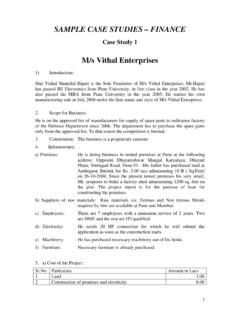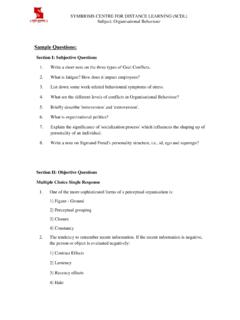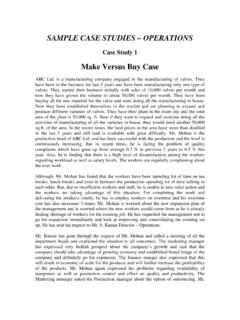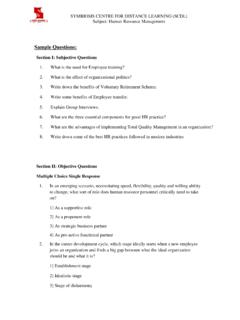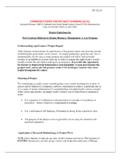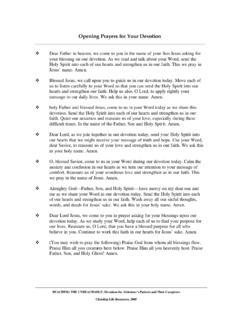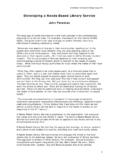Transcription of Symbiosis College. International Conference. - SCDL
1 Symbiosis college . International conference . 0n: 10th and 11th March 2017. Title: reaching the unreachable through E-resources. By: Yousif Khorsheed Saeed. (Kurdisthan, Iraq) Institute of Advanced studies In English. Title: reaching the unreachable through E-resources. Abstract: In this digital era, we must encourage to reach out to the unreachable in the point of view of education. E-resources are a very important tool that can enable this procedure. E-learning and technology can enhance ODL distance learning. Education can be imparted across the globe any part of the world due to the facilities of E-learning, Multimedia and Technology as a whole. All the barriers can be broken to help impart education. The answer to this is Distance learning and the help for this is Technology and E-resources. The user s needs and usage of e-resources are day by day increasing, depending on their academic need. This paper discusses the advantages of electronic resources for academic purposes and the change in Distance education can go through due to e-resources.
2 The main objective of this paper is academicians should know the importance and advantages of electronic resources and utilize the maximum electronic resources and given by some suggestions to increase the electronic resources usage in future. Need and importance: Especially in the field of Distance Education, We stress the word "useful" because electronic resources complement, but seldom replace, more conventional teaching techniques. Electronic tools can make classes more efficient; lectures more compelling, informative, and varied; reading assignments more extensive, interesting, and accessible; discussions more free ranging and challenging; and students' papers more original and well researched. Advances in computer applications during the past few decades have brought radical changes in the way information is gathered, store, organized, accessed, retrieved and consumed. The application of computers in information processing has brought several products and services to the scene.
3 The Internet and the Web are constantly influencing the development of new modes of scholarly communication; their potential for delivering goods is quite vast, as they overcome successfully the geographical limitations associated with the print media. Further, the distribution time between product publication and its delivery has been drastically reduced. The Internet can be used for efficient retrieval and meeting information needs. Objectives of the Study: The objectives of the study are: To create the awareness of the usage of e-resources among the academic work of students, faculty and research scholars in distance education. To analysis the advantages and importance of electronic resources all educational purposes. To enhance the use of multimedia, technology and e-resources to encourage distance learning. Assumptions: E-resources are easily available to all due to the progress in online matter.
4 Education is changing with the availability of resources. Research questions: Would the surge and increase in e-resources change the scenario of education? Operational Definitions: Change Means make or become different. Education means make or become different. E-Resources means a book is an e-book, or any other study material which you can read online from anywhere. Methodology: The researcher used the survey method survey was conducted on 50 school teachers of various schools in Pune District. Tool used was some discussion, observation, (participant) and a self -constructed questionnaire. A] In order to create awareness a demonstration was done of a multimedia lesson in Distance mode. Explanation was done about the use and how beneficial it could be. The advantages were discussed and how it could make life easier for them and the students were discussed. B] In order to find out the problems they face or their opinions of the same a self-constructed questionnaire was prepared and administered by the researcher.
5 Population: Parents, Teachers and students of Pune city was considered. Sample: 50 students and their parents. 50 teachers from ICSE and CBSE schools were considered. Numerical Technique: Average / percentage. Analysis. Average / percentage. 1= Aware 2= not aware. 1= yes, agree: 2= Do not agree. 1= yes 2= no 3= sometimes. Awareness of parents of to learn by Teachers who use and encourage E-resources in the distance education process. 1= always; 2= never; 3= sometimes. 1= 85% agrees; 2= 15% does not agree. 05101520253035123 Read and make use of online E-resources is the answer to Distance learning12 1=92% yes. 2=08% No. Suggestions: Help students to get to know their course material through all possible electronic mediums design study material to enable learning by themselves and to give basic knowledge and information they need to get through the course. Encourage extra reading materials like give the students favourable links and demo lessons to enhance all types of learners Reading around the chosen subject will give them a greater breadth and depth of knowledge, so extra reading and research can really help in distance studies.
6 Suggest good resources, to offer extra advice based on their own experience as well. Set a required time to study: Organisation is key to succeeding in distance learning, especially if students are managing work and family commitments as well. Setting aside regular, short hours of time to spend on studies is much better. Distance learning gives the flexibility to study at a time that suits the students, so they must make use of it especially through all the E-resources available. Set regular goals to help the students be at par: Breaking down the ultimate goal into small, manageable steps is the best way to make regular progress whilst feeling like they re actually achieving something. Set assignments and deadlines to encourage the students to complete and submit work on time. Cater for students own learning style: Try to convert the topics or subject they re studying into a format that helps them to learn best, whether that s reading, listening, looking or doing.
7 Advise towards some useful E-resources to help Audio, Visual or kinaesthetic learners. Tokens of appreciation goes a long way to motivate and encourage learners. Give the students certificates and valid appreciation so that they can be encouraged to learn more. This is a great way to stay motivated on your course and get some much-needed encouragement and praise as you achieve your goals. Believes Distance Education is the key to success in education12 Keeping in regular contact with your students is essential to help students to stay motivated on your course. Guides and tutors from the distance learning should be approachable and helpful. Conclusion Access to e- Resources (e-journals and e-books) is very much useful to teachers and users as there is a growing demand of distance education. Online resources make their appearance on the net much before the print copies reach the subscribers. Based on the analysis of advantages of electronic resources for academicians, Compare with advantages and disadvantages of e-resources maximum majority is more advantages for academic users and they regard them as less reliable.
8 Making availability will be helpful to improve the digital resources usage and services for the benefit of students, faculty and research scholars in future. Electronic resources do not occupy a great deal of physical storage space, and can be accessed remotely thereby encouraging Distance learning to the maximum. Electronic libraries can provide a vehicle for extending collaboration, which is at the heart of the academy, with the aim of more effective Distance education. The increasing the electronic resources subscription bring more satisfaction to users due to the convenience and conducive environment of learning. The library professionals and information providers should make an endeavour to give the right resources (e-resources) to the right user at the right time. This will benefit the teaching- learning scenario on a large scale. Education will progress in every direction and we will indeed reach the un reachable.
9 References: Francis. (2012), Evaluation of Use of Consortium of e-Resources in Agriculture in Context of Kerala Agricultural University, DESIDOC-Journal of Library and Information Technology, 32 (1): 38-44. Dalene Hawthorne, Emporia State University, USA Halima Saida Edberongbe. (2011) The Use and Impact of Electronic Resources at the University of Lagos, Library Philosophy and Practice. Available at: http:// Khaiser Nikam, Dhruva Kumar. (2013), Evaluating the Effective Use of Electronic Journals by Academia, DESIDOC-Journal of Library and Information Technology, 33 (2): 125-130. Projes Roy, Shailendra Kumar, Satija. (2012), Problems in Searching Online Databases: A Case Study of Select Central University Libraries in India, DESIDOC-Journal of Library and Information Technology, 32 (1): 59-63. R. Vijesh, GRD Memorial Library, PSG college of Technology & Polytechnic college Peelamedu, Coimbatore 641 004, Tamil Nadu, India Sharma, Chelan.
10 (2009), Use and Impact of e-Resources at Guru Gobind Singh Indrapratha University (India): A Case Study, Electronic Journal of Academic and Special Librarianship, 10 (1): 1 8. Subhash Khode, Ajay Khode. (2003), Free Online Serials in the Area of Library and Information Science, Annals of Library and Information Studies, 50 (4): 146-152. The Chicago Handbook for Teachers: A Practical Guide to the college Classroom by Alan Brinkley, Betty Dessants, Michael Flamm, Cynthia Fleming, Charles Forcey, and Eric Rothschild



